Passiontide and Easter 2021
By
Brian Wison
With fewer recordings having been made in the last year, the new releases
for this time of year offer slimmer pickings than usual, so I’ve leavened
the newbies with some old favourites, and got ahead of myself with some
albums not due to appear until just before or even after Easter.
Index
:
BACH CPE
Die Auferstehung
– Ex Tempore – Hyperion Helios
BACH JS
St John Passion – Japan Bach Collegium – BIS
- Easter Cantatas – Munich Bach Choir – DG
BRUCKNER, Michael HAYDN
Motets – MDR Leipzig Radio Choir – Pentatone
FRANCK
Organ Works – Sakari – BIS
GRAUPNER
Easter Cantatas – Capella Vocalis Boys’ Choir, Pulchra Musica Baroque
Orchestra - Capriccio
GUERRERO
Magnificat, Lamentations and Canciones – El León de Oro – Hyperion
HANCOCK
Choral and organ music – St Thomas Choir – Signum
HANDEL
Brockes Passion
– Wenzinger – DG Archiv; McGegan – Hungaroton; Neumann – Carus; Cummings –
Accent; Egarr – AAM; Concerto Copenhagen – CPO;
 Arcangelo – Alpha
Arcangelo – Alpha
- Messiah – Akademie für alte Musik – Pentatone
MacMILLAN
– Choral Works – Polyphony – Hyperion
- Tenebræ Responsories, etc – Westminster Cathedral Choir –
Hyperion
MAHLER
Symphony No.1 (with Blumine) – Les Siècles – Harmonia Mundi
RIGATTI
Vespers - I Disinvolti, UtFaSol Ensemble – Arcana; Gabrieli Consort and
Players – Presto/DG
RIHM
Astralis
– RIAS Kammerchor – Harmonia Mundi
SCHUMANN
Symphonies – Czech PO – Pentatone
SCHWEITZER
Die Auferstehung Christi; Missa Brevis
– Thuringer Bach Collegium – Capriccio
de WERT
Divine Theatre – Stile Antico – Harmonia Mundi
de WERT, RIHM
In Umbra Mortis
- Cappella Amsterdam – Pentatone
And the Sun darkened: Music for Passiontide – New York Polyphony – BIS
Easter Mattins – King’s College Choir, Cambridge – Decca
***
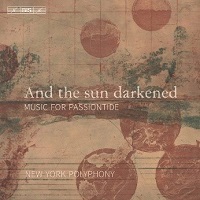 And the
Sun darkened
And the
Sun darkened
Loyset COMPÈRE (c.1445—1518)
Crux triumphans
[5:55]
Josquin DESPREZ (c.1450—1521)
Tu pauperum refugium
[3:04]
Andrew SMITH (b.1970)
Salme 55
(Manuscript) [12:27]
Adrian WILLAERT (c.1490—1562)
Pater noster — Ave Maria:
Pater noster
[4:34]
Ave Maria
[3:33]
Cyrillus KREEK (1889—1962)
Taaveti laul 22
(Psalm 22) [4:37]
Loyset COMPÈRE
Officium de Cruce
[19:22]
Pierre de la RUE (c.1452—1518)
O salutaris hostia
[3:08]
New York Polyphony
rec. June 2018, Princeton Abbey, Princeton, New Jersey, USA. DDD/DSD.
Texts and translations included
Reviewed as streamed in 24/96 stereo.
BIS-2277 SACD
[58:26] SACD from
AmazonUK
–
Presto
Released by some suppliers as a download or for streaming in early March
2021, it seems perverse that the SACD and the download from BIS’s partners
at eclassical.com will not be available until a few days before Easter.The
programme is not wholly devoted to the Passion, but several of the works are based
on texts relating to it, opening with Compère’s Crux triumphans
(the triumphant cross), including his Officium de cruce, known as
the Devotion of the Cross, and closing with the de le Rue hymn O salutaris hostia (O saving Victim, sung in honour of the
institution of the Eucharist on Maundy Thursday).
New York Polyphony have made a number of fine recordings for BIS. The first
of their these that I came across,
back in May 2012,
included Brumel’s Requiem Mass and Crecquillon’s setting of the
Lamentations, so that also remains suitable for Passiontide, if you haven’t
come across it. (Ignore the stupid typo in my review that says it’s available in 14-bit,
there being no such thing; I meant, of course, 24-bit.
Eclassical.com
have now added the choice of surround sound for the same price as 24-bit
stereo, a very reasonable $13.99.) That recording established their
reputation as rivalling the established groups whom we think of in this
repertoire, and served to remind us that the music of lamentation can sound
beautiful. That’s equally true of the new recording, perhaps even more so.
You may be wondering how well the music of a living composer and one from the
late C20 blends with the polyphony of 500+ years ago; the answer is, very
well indeed. The Andrew Smith setting of Psalm 55 was composed for New York
Polyphony, so it suits their voices exceptionally well. Cyrillus Kreek’s
setting of Psalm 22 opens with the cry of Jesus on the cross, ‘My God, my
God, why hast thou forsaken me’.
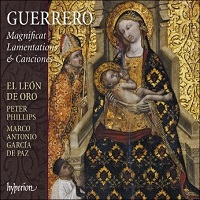 Francisco GUERRERO (1528-1599)
Francisco GUERRERO (1528-1599)
Magnificat, Lamentations and Canciones
El León de Oro/Peter Phillips
rec. October 2019, Iglesia del Real Monasterio de San Salvador de
Cornellana, Asturias, Spain
Reviewed as 24/96 download with pdf booklet from
hyperion-records.co.uk.
HYPERION CDA68347
[60:37] CD from
AmazonUK
–
Presto
The Lamentations, part of the Holy Week liturgy, constitute only
nine minutes of this recording, which I have already prefigured in my
round-up of recent Chandos and Hyperion releases,
but I’m including it here in case you missed it. Don’t overlook it –
Peter Phillips’ work with this Spanish choir is just as fine as his
recordings with his own Tallis Scholars and Merton College, Oxford, where
he shares the choral hot seat. Guerrero here receives the kind of
performance and recording that is needed to help foster his reputation.
Phillips’ earlier recording with this group, Amaræ morti, contains settings of the
Lamentations by Phinot, Cardoso and Lassus, together with other music
mainly of a penitential nature (CDA68279 –
review
–
review
–
Winter 2019/2).
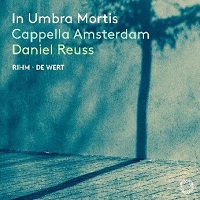 In Umbra Mortis: A chromatic journey
In Umbra Mortis: A chromatic journey
Giaches de WERT (1535-1596)
Wolfgang RIHM (b.1952)
Tristis est anima mea
(Rihm) [2:47]
Vox in Rama
(de Wert) [3:48]
Ecce vidimus
(Rihm) [4:15]
Velum templi scissum est
(Rihm) [3:50]
Amen, amen dico vobis
(de Wert) [5:53]
Tenebræ factæ sunt
(Rihm) [5:17]
Caligaverunt oculi mei
(Rihm) [4:55]
Peccavi super numerum
(de Wert) [7:44]
Recessit pastor noster
(Rihm) [3:00]
Adesto dolori mei
(de Wert) [3:36]
Aestimatus sum
(Rihm) [5:34]
Quiescat vox tua
(de Wert) [6:46]
Cappella Amsterdam/Daniel Reuss
rec. Pieterskerk Utrecht, Netherlands, October 2020. DDD.
Texts and translations included
Reviewed as downloaded from press preview
PENTATONE PTC5186948
[57:32] Due for release in May 2021.
It’s something of a missed opportunity that this recording is not scheduled
for release until May; it’s almost tailor-made for Holy Week, with settings
of words from the liturgy and other penitential texts. And, though Rihm’s Sieben Passions Texte date from 2001 to 2006, their tone is a good
match for the music of de Wert with which they are inter-mingled, old and
new in harmonious juxtaposition. The Wert pieces come from his Secondo libro de motteti a 5 (1581), Modulationum cum 6 vocibus liber primus (1581) and Motectorum 5 vocum liber primus (1566). I
am not alone in regarding his music as some
of the finest of the period, and it receives fine performances here.
The Rihm is less familiar, but, on the evidence of this recording, deserves
to be better known. If you can’t wait until May, but wish to hear this
beautifully sad music in Holy Week, there’s a Harmonia Mundi album which
includes it, together with his 1968 Fragmenta Passionis and Astralis. (HMC902129, RIAS
Kammerchor/Hans-Christoph Rademann, CD, or download in up to 24-bit, with
pdf booklet, from
eclassical.com).
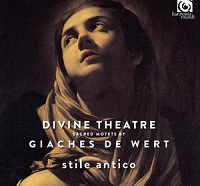 If you want to hear some of Wert’s wonderful sacred music without waiting
for May, there’s a very fine collection entitled Divine Theatre
(Harmonia Mundi HMM807620 –
review: Recording of the Month –
review). The performances by Stile Antico are excelled only by their most recent
recording of the music of Josquin des Prez released by their new label, Decca. And,
good as the new Decca is – I gave it Recommended status in my
round-up of recent releases
from Decca and DG – the Harmonia Mundi booklet is a more de-luxe affair.
If you want to hear some of Wert’s wonderful sacred music without waiting
for May, there’s a very fine collection entitled Divine Theatre
(Harmonia Mundi HMM807620 –
review: Recording of the Month –
review). The performances by Stile Antico are excelled only by their most recent
recording of the music of Josquin des Prez released by their new label, Decca. And,
good as the new Decca is – I gave it Recommended status in my
round-up of recent releases
from Decca and DG – the Harmonia Mundi booklet is a more de-luxe affair.
The Harmonia Mundi recording was one of the last which they released on
SACD. The 24/88.2 equivalent from
eclassical.com,
with pdf booklet, is also well worth downloading, albeit that it’s hi-res
stereo only, no surround sound. It offers music for various seasons of the
church year, including Vox in Rama and Peccavi super numerum, also included on the new Pentatone, and O crux, Ave, spes unica, also appropriate for Holy Week.
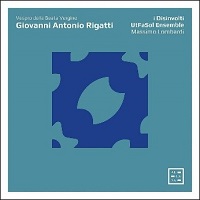 Giovanni Antonio RIGATTI (c.1613–1648)
Giovanni Antonio RIGATTI (c.1613–1648)
Vespro della Beata Vergine
From
Messa e salmi ariosi a tre voci concertati, & parte con li ripieni
a beneplacito
(Venice, 1643)
Andrea GABRIELI (c.1533–1585)
Introitus: Intonazione del Sesto Tono
[1:42]
Versiculum: Deus in adiutorium
[0:11]
Carlo MILANUZZI [1590/92–c.1647]
Responsorium: Domine ad adiuvandum
[2:00]
Antiphona I: Dum esset rex
[0:29]
Giovanni Antonio RIGATTI
Psalmus I: Dixit Dominus
[5:18]
Giovanni Battista RICCIO (fl. 1609–1621)
In loco antiphonæ: Sonata a 4
[4:33]
Antiphona II: Læva eius
[0:21]
Giovanni Antonio RIGATTI
Psalmus II: Laudate pueri
[5:29]
Serafino Patta (fl. 1606–1619)
In loco antiphonæ: Læva eius
[2:00]
Antiphona III: Nigra sum
[0:28]
Giovanni Antonio RIGATTI
Psalmus III: Lætatus sum
[5:34]
Adriano BANCHIERI (1568–1634)
In loco antiphonæ: Nigra sum [
2:59]
Antiphona IV: Iam hiems transiit [
0:29]
Giovanni Antonio RIGATTI
Psalmus IV: Nisi Dominus
[3:40]
Francesco USPER (c.1560–1641)
In loco antiphonæ: Ricercar Ottavo
[3:35]
Antiphona V: Speciosa facta es
[0:28]
Giovanni Antonio RIGATTI
Psalmus V: Lauda Ierusalem
[5:11]
Antiphona V: Speciosa facta es
[0:28]
Capitulum: Ab initio
[0:32]
Gioanpietro Del BUONO [d. c.1647]
Hymnus Ave Maris Stella
[8:14]
Versiculum Dignare me
[0:30]
Responsorium Da mihi
Antiphona Beatam me dicent
[0:29]
Giovanni Antonio RIGATTI
Canticum Magnificat
[7:36]
Adriano BANCHIERI
In loco antiphonæ Canzon l’Alcenagina sopra «Vestiva i colli»
[2:47]
Oratio Concede non famulos tuos
[1:07]
Versiculum Benedicamus Domino
[0:32]
Giovanni Antonio RIGATTI
Antiphona Salve Regina
[4:59]
Recessio Plaudite manibus
[4:59]
Includes several first world recordings
I Disinvolti
UtFaSol Ensemble
Quarter-comma meantone, A = 440 Hz
rec. 1-3 May 2018 and 5 June 2019 (plainchant), Monte Magrè (Schio,
Vicenza), Chiesa dei Santi Filippo e Giacomo. DDD.
ARCANA A121
[76:54] CD from
AmazonUK
Though this is not specifically music for Easter, Rigatti’s setting of
Vespers for the Virgin Mary strikes an appropriately festal note, with
Antiphon IV celebrating the passing of Winter and the arrival of Spring in
beautiful poetry from the Song of Songs. It’s not due for release on CD till after
Easter, but the download and streamed versions may precede that. In any
case, there should, all being well, be more to celebrate in terms of the
ending of lockdown by then.
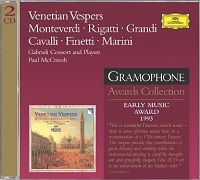
There’s more music by Rigatti on a 2-CD collection of Venetian Vespers. The other composers are
Monteverdi, Grandi, Cavalli, Finetti, Marini, Banchieri, Giovanni
Gabrieli
and Fasolo.
I’ve owned, and regularly played the original set since it was released,
and I’m pleased that Presto have rescued it as one of their special CDRs: DG 4761868, very good value at £12.75 for 95 minutes of
superb music-making from the Gabrieli Consort and Players and Paul
McCreesh. It's one of their reconstructions of special occasions, in this case a
First Vespers of the Virgin Mary as it might have been celebrated at Venice
in 1643. The CDR is actually less expensive than the download, which comes
without a booklet.
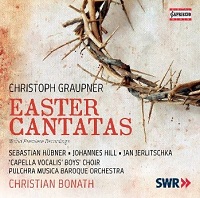 Christoph GRAUPNER (1683-1760)
was the first choice of the Leipzig council for the post that was
eventually filled by ‘second-best’ Johann Sebastian Bach. A programme
entitled Easter Cantatas, recorded in 2019, actually
contains one work each for Maundy Thursday (Die Frucht des Gerechten ist ein Baum, 1733), Good Friday (Eröffnet Ihr Augenquellen, 1725), Easter Day (Der Sieg ist da,
1743) and Easter Monday (Ihr werdet traurig sein, 1719). All four are first recordings.
Christian Bonath conducts Capella Vocalis Boys’ Choir, Pulchra Musica
Baroque Orchestra and soloists on Capriccio NR C5411
[57:34]. CD from
AmazonUK
–
Presto
Christoph GRAUPNER (1683-1760)
was the first choice of the Leipzig council for the post that was
eventually filled by ‘second-best’ Johann Sebastian Bach. A programme
entitled Easter Cantatas, recorded in 2019, actually
contains one work each for Maundy Thursday (Die Frucht des Gerechten ist ein Baum, 1733), Good Friday (Eröffnet Ihr Augenquellen, 1725), Easter Day (Der Sieg ist da,
1743) and Easter Monday (Ihr werdet traurig sein, 1719). All four are first recordings.
Christian Bonath conducts Capella Vocalis Boys’ Choir, Pulchra Musica
Baroque Orchestra and soloists on Capriccio NR C5411
[57:34]. CD from
AmazonUK
–
Presto
Almost forgotten until recently, it’s good that Graupner’s music is
receiving attention again. There are no neglected masterpieces here, but
four very workmanlike cantatas in performances and recording that should
help advance the Graupner cause.
George Frideric HANDEL (1685-1759) Brockes-Passion
The arrival of a new recording of Handel’s Brockes-Passion (HWV48,
before 1719) reminds me that a choice of recordings would have been unheard
of, not so very long ago. When DG released August Wenzinger’s recording in
1968 on three Archiv LPs (SAPM198418-20), it was only as a limited edition.
Stanley Sadie, in a detailed Gramophone review, seemed almost surprised to
discover that, while no match for Bach’s two great settings, both of which
draw on material from the Brockes-Passion text, it was certainly
not to be rejected out of hand; indeed, he ended by warmly recommending it.
As an example of Bach’s librettist borrowing and improving parts of the text, compare CD 2,
track 10 Den Himmel gleicht / Sein buntgefärbter Rücken with
Bach’s
Erwäge, wie sein blutgefärbter Rücken / In allen Stücken / Dem Himmel
gleiche geht
(St John Passion).
As so often, it’s the effortless superiority of Bach’s sacred music,
especially the Passions and the B-minor Mass that dwarfs his
contemporaries. Otherwise, I’m sure that the Handel, Keiser and Telemann
settings of the Brockes-Passion would have become better known and
appreciated. Some of the words are gash, but so are some of the words of
the Bach cantatas, and look what he made of those. The high Lutheran piety
of Bach’s and Handel’s day was very different from today’s forms of
spirituality. And we are only just beginning to appreciate the music of
Graupner, whom the Leipzig council preferred to Bach, not unreasonably given
the comparative output of the two at the time, not to mention JSB’s
reluctance to teach Latin.
The text, by Barthold Heinrich Brockes, was published in 1712 and the Handel
setting – one of many, including one by Telemann (review)
and Keiser (review)
– was performed in Hamburg in 1719; the exact date and place of composition
are not known, but Handel had been living in London for some time by 1719.
As well as the Handel, Telemann and Keiser, there’s a much shorter setting
by Fasch, decently performed but badly presented by Naxos (review).
Some of the recordings that I am about mention come as downloads without a
booklet: German speakers will find Handel’s text
online. Those familiar with Bach will be surprised that, after the overture,
Handel’s Der für die Sünde der Welt gemarterte und sterbende Jesus
opens with familiar words, albeit set in a slightly different form by Bach: ‘Mich vom
Stricke meiner Sünden zu entbinden wird mein Heil gebunden’.
As far as I am aware, the Wenzinger recording was the first; it remains
available as a download:
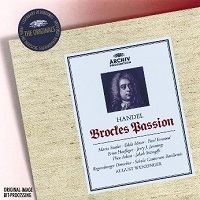 Maria
Stader (soprano), Edda Moser (soprano), Paul Esswood (alto), Ernst Haefliger
(tenor), Jerry Jennings (tenor), Rosemarie Sommer (alto), Theo Adam (bass),
Jakob Stämpfli (bass), Verena Scheidegger (soprano);
Maria
Stader (soprano), Edda Moser (soprano), Paul Esswood (alto), Ernst Haefliger
(tenor), Jerry Jennings (tenor), Rosemarie Sommer (alto), Theo Adam (bass),
Jakob Stämpfli (bass), Verena Scheidegger (soprano);
Regensburger Domchor/Hans Schrems (chorus master),
Schola Cantorum Basiliensis/August Wenzinger
rec. July 1967, Kirche St. Emmeram, Regensburg. ADD/stereo
Digital booklet included.
DG ORIGINALS 4636442
[2 CDs - 3:01:32] Download (mp3 and lossless) from
Presto
– the least expensive I can find in lossless sound and the only one to
include the booklet. Stream from Naxos Music Library (mp3, no booklet).
The early music revolution has tended to make us think that everything that
went before, using modern instruments, should be forgotten. That’s not true
of this or another set of DG Archiv recordings from the 60s and 70s, the
Bach cantatas which Karl Richter recorded, also with some of the finest
soloists of the day. A few years ago, DG released all 75 – not quite the
whole cycle – on blu-ray, with smaller bundles, around 5 hours each, as
downloads. I thought that an excellent arrangement; it’s so much neater to
have so much music on blu-ray audio, while those seeking only to fill out a
Bach cantata library could choose the downloads, but now to buy the blu-rays
also entails buying 95 CDs; is that progress? (See below under Bach.)
The Wenzinger Brockes-Passion shares many of the qualities of the
Richter Bach cantatas; it’s conducted with a sense of baroque style and the
soloists are some of the best voices of the time, and it’s still well worth
considering. If you choose one of the more recent recordings, at least try
to listen to this as streamed.
Though Brockes-Passion was broadcast by the BBC in 1974 in a performance by
the London Bach Society and the Steinetz Bach Players, the next recording
seems not to have been made until 1985, on Hungaroton, on LP and later on
CD. That, too, survives in download-only form:
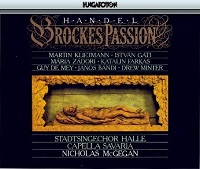 Martin Klietmann (tenor), István Gáti (baritone), Mária Zádori (soprano),
Katalin Farkas (soprano), Guy De Mey (tenor), Gunther Burzynski (baritone),
Drew Minter (alto), Eva Bartfai-Barta (soprano), Peter Bajan (alto), Tamas
Csanyi (alto), Eva Lax (contralto), János Bándi (tenor)
Martin Klietmann (tenor), István Gáti (baritone), Mária Zádori (soprano),
Katalin Farkas (soprano), Guy De Mey (tenor), Gunther Burzynski (baritone),
Drew Minter (alto), Eva Bartfai-Barta (soprano), Peter Bajan (alto), Tamas
Csanyi (alto), Eva Lax (contralto), János Bándi (tenor)
Stadtsingechor zu Halle,
Capella Savaria/Nicholas McGegan
rec. Savaria Museum, Szombathely, Hungary, August 1985. DDD.
HURNGAROTON HCD12734-36
[2:29:30] Download from
Presto
(no booklet). Stream or download from
Qobuz
(the least expensive lossless download, no booklet).
The Brilliant Classics box which included this recording of Handel’s Brockes-Passion and his Johannes-Passion is no longer
available. Robert Hugill thought it made a strong case for both works –
review.
An Aachen Bach-Verein recording from 2009 seems to have dropped out of ken,
but a live Carus recording from the same year, using the copy of work made
by Bach, survives:
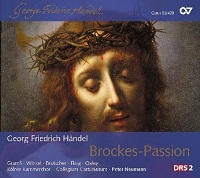 Nele Gramß (soprano, Tochter Zion), Johanna Winkel (soprano, Gläubige
Seele), Markus Brutscher (tenor, Evangelist), Markus Flaig (baritone,
Jesus), Elvira Bill (Maria), Jan Thomer (Judas), James Oxley (Petrus),
Michael Dahmen (bass)
Nele Gramß (soprano, Tochter Zion), Johanna Winkel (soprano, Gläubige
Seele), Markus Brutscher (tenor, Evangelist), Markus Flaig (baritone,
Jesus), Elvira Bill (Maria), Jan Thomer (Judas), James Oxley (Petrus),
Michael Dahmen (bass)
Kölner Kammerchor
Collegium Cartusianum/Peter Neumann
CARUS 83.428
[2 CDs – 152:39] CD from
Presto
or
Amazon UK
Recording of the Month –
review. (Also available from some dealers in 13-CD set –
review).
For Johan van Veen, this is the version against which to judge all
subsequent recordings, though the use of the Bach text, with its variant
readings, means that it isn’t exactly comparable.
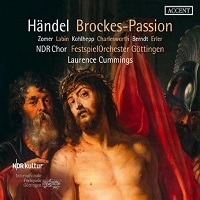 2019 brought forth two recordings. The first on the Accent label, employing
a new edition:
2019 brought forth two recordings. The first on the Accent label, employing
a new edition:
Johannette Zomer (soprano, Daughter of Zion); Ana Maria Labin (soprano,
Mary/Believer/John); Sebastian Kohlhepp, (tenor, Evangelist); Rupert
Charlesworth (tenor, Peter/Believer); Tobias Berndt (baritone,
Jesus/Believer); David Erler (countertenor, James/Judas/Soldier)
NDR Chor
FestspielOrchester Göttingen/Laurence Cummings
rec. live, 25 May 2017, Stadthalle, Göttingen, Germany. DDD
Text and translation included
ACCENT ACC26411
[2 CDs: 151:00] – for CD purchase see
review
by Dave Billinge.
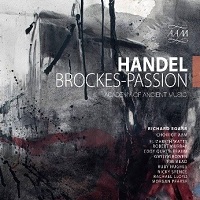 Robert Murray (tenor), Cody Quattlebaum (bass-baritone), Elizabeth Watts
(soprano), Gwilym Bowen (tenor), Kate Symonds-Joy (alto), Cathy Bell
(alto), Tim Mead (counter-tenor), Morgan Pearse (bass-baritone), Rachael
Lloyd (mezzo), Ruby Hughes (soprano), Philippa Hyde (soprano), Nicky Spence
(tenor)
Robert Murray (tenor), Cody Quattlebaum (bass-baritone), Elizabeth Watts
(soprano), Gwilym Bowen (tenor), Kate Symonds-Joy (alto), Cathy Bell
(alto), Tim Mead (counter-tenor), Morgan Pearse (bass-baritone), Rachael
Lloyd (mezzo), Ruby Hughes (soprano), Philippa Hyde (soprano), Nicky Spence
(tenor)
Academy of Ancient Music Choir
Academy of Ancient Music/Richard Egarr
Edited by Leo Duarte and Richard Egarr
rec. Henry Wood Hall, London, 11, 17, 18 April 2019; Barbican Hall, London,
19 April 2019. DDD.
Text and translation included.
Reviewed as streamed in 24/96 sound.
AAM AAM007
[154:51] CD from
AmazonUK
–
Presto
Can a group of Anglophone performers bring off this work of North German
Lutheran piety? Johan van Veen’s negative verdict of the closing chorus,
sung by Christ Church Choir, Oxford, on a Nimbus CD of Oxford Church Anthems would suggest otherwise (‘very un-German’ –
review). In fact, the Academy offer one of the most compelling recordings of this work,
effectively providing the strongest challenge to the new recording. It’s not
the least of its virtues that it comes with such detailed and scholarly
documentation, including the text both in its C18 spelling and in the
modern German equivalent.
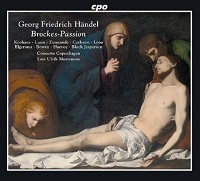 2020 continued the flow of recent recordings:
2020 continued the flow of recent recordings:
Maria Keohane, Joanne Lunn, Hanna Zumsande (sopranos)
Daniel Carlsson, Daniel Elgersma (altos)
Ed Lyon, Gwilym Bowen (tenors)
Peter Harvey, Jakob Bloch Jespersen (basses)
Concerto Copenhagen/Lars Ulrik Mortensen (harpsichord)
rec. 2019, Garnisonkirche, Copenhagen. DDD/DSD
Text and translation included.
CPO 555286-2 SACD
[79:20 + 78:00] – for SACD availability see
review
by Simon Thompson: ‘Both Handel’s work and this performance are warmly
recommended to diversify your Eastertide listening’.
Now the latest recording, released in March 2021:
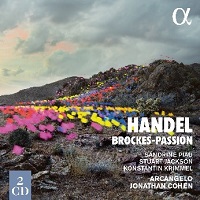

Sandrine Piau (soprano, Tochter Zion)
Stuart Jackson (tenor, Evangelist)
Konstantin Krimmel (baritone, Jesus)
Mhairi Lawson (soprano), Mary Bevan (soprano)
Alex Potter (alto), David Allsopp (alto)
Matthew Long (tenor), Andrew Tortise (tenor)
Marcus Farnsworth (baritone), William Gaunt (bass)
Arcangelo/Jonathan Cohen
rec. 9-13 October 2019, St Jude’s Church, London. DDD.
Text and translations included.
Reviewed as lossless press preview
ALPHA 644
[80:37 + 80:06] CD from
AmazonUK
–
Presto
Where most of these recordings come with the clear advantage of a
German-speaking cast, the new Alpha has its own advantage in drawing on a
distinguished international team. Even some of the minor roles are taken by
well-established singers, such as the sopranos Mhairi Lawson and Mary Bevan
as Maids and Faithful Souls.
To be fair, none of these singers have any real problems with the German
text – nothing here like Placido Domingo’s Wagner – though Sandrine Piau as
the Daughter of Zion, commenting on the action as in Bach, prioritises
beautiful singing at the expense of diction, as in Der Gott, dem alle Himmelkreise (CD1 track 5). Piau apart, the
other singers take us with them into the story as it develops – and I can’t
be critical when she sings so beautifully. In other arias, she doesn’t
spare to take the sinful listener by the throat, as, too, does Stuart
Jackson as the Evangelist, making recitative almost as interesting as the
arias. In fact, by the time that we reach CD1 track 18: Brich, mein Herz, Piau’s diction
has become much clearer.
As Jesus, Konstantin Krimmel is mostly confined to short and pithy
utterances, as recorded in the gospels. He sings them impressively with a
lighter baritone tone, though some may yearn for a bass-baritone more like
the voice of Theo Adam on the Wenzinger recording. You may lean, too,
towards the older style of the Wenzinger recording in some of the choruses:
Cohen and his team take just 3:24 over the first aria and chorus, bidding
the long-strayed sinners to return to their salvation, where Wenzinger
expends this chorus to 5:41. I can’t, however, say that Cohen skates over
this and the other choruses; there’s still plenty of feeling, not just as
intense.
Most of the recordings of the Brockes Passion come with a cover
that has something to do with the theme or the composer. I’ve given up
trying to guess the relevance of Alpha’s recent covers; they used to
tempt the buyer
with relevant works of art. No longer. Otherwise, this new recording stands
up well against its predecessors. Arcangelo and Jonathan Cohen made a
number of recordings of Bach, Handel and other composers for Hyperion which
steered a middle course between authenticity and making the music
accessible to most modern listeners. I made their recording of Handel’s Finest Arias for Base Voice a Recording of the Month –
review
– as did Jonathan Woolf –
review
. See also John Quinn’s recording of the Month
review
of Arcangelo’s Bach b-minor Mass. The new Brockes-Passion shares
the same qualities.
The cover apart, the booklet is well produced, with texts and translations. There’s some
slightly sloppy editing: the track summary for CD1, track 6 quotes Jesus as
saying ‘Das ist mein Blut, das neue Testament’ when, in fact, he sings ‘Das
ist mein Blut im neuen Testament’. As I was completing this review, this new
Alpha recording was chosen as Recording of the Week on the BBC Radio 3
Record Review. I had been wondering about awarding it Recommended status;
it’s good to be able to find agreement.
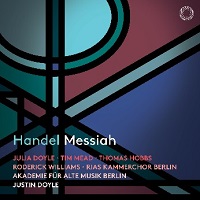 George Frideric HANDEL
George Frideric HANDEL
Messiah
(1742)
Julia Doyle (soprano), Tim Mead (countertenor), Thomas Hobbs (tenor) and
Roderick Williams (baritone)
RIAS Kammerchor Berlin
Akademie für Alte Musik Berlin/Justin Doyle
rec. Jesus-Christus-Kirche, Berlin-Dahlem, in January 2020. DDD.
Text included.
Reviewed from lossless (wav) download.
PENTATONE PTC5186853
[50:35 + 83:55] CD from
AmazonUK
–
Presto
Messiah
is much more familiar than the Brockes-Passion, of course, though
we tend now to associate it with Christmas rather than Easter, as
originally intended. In fact, Pentatone released this recording in late 2020 in
time for Christmas, when it was
reviewed and recommended
by Mike Parr – Recording of the Month.
I’ve just been listening to some Handel arias, including O thou that tellest and He was despised, from Messiah, sung by Kathleen Ferrier with accompaniment directed by
Sir Adrian Boult, so hugely popular in its day that Decca later recorded it
with a new stereo accompaniment. Considering that I don’t normally warm to
Ferrier’s voice, I was surprised to find myself enjoying those arias,
though they are better captured by the engineers on the new Pentatone. Ferrier and Boult give us Handel as
printed on the page of the old Ebenezer Prout edition, with no attempt at
ornamentation. I wonder what they would have made, for example, of Tim
Mead’s O thou that tellest (CD1, tr.9). Not only is the
accompaniment much lighter than Boult’s and the basic tempo a shade faster
– not massively – but Mead lightly ornaments the music. There was a time
when ‘authenticity’ went a little crazy in its infancy and had singers, and
even choruses, adding all manner of double dotting and ornamentation, but,
fortunately, the craze has settled and recordings like the Pentatone give
us a much lighter dose of it. The ornamentation is especially appropriate, as applied here,
in da capo repeats.
The difference between the old norm and the new is even more marked in He
was despised (CD2, tr.2). Mead doesn’t try to squeeze all the emotion that
he can out of the words, and Justin Doyle doesn’t allow the tempo to drag,
so how does the new version run 10:07 when Ferrier and Boult, rather
over-egging the sorrow and grief, took only 6:44? The answer is that Mead
and Doyle observe more repeats and vary the music between repeats – second
time around, there’s a little more sadness in the music and, course, more
of the light ornamentation. As Mike Parr notes in his review – link above –
this aria ‘eschews any hint of the operatic in a beautiful performance that
hits straight to the heart’.
It’s possible to enjoy both approaches, but I can’t imagine that I shall
ever again listen from choice to a complete Messiah in an
old-school recording. The only problem is that, while I agree with Mike
Parr’s recommendation, there are so many very fine recent recordings of
this wonderful work that it’s hard to single one out to go top of the tree.
Michael Greenhalgh liked the Hervé Niquet recording on Alpha 362 –
review
– better than I did –
Autumn 2017/3,
but you can find a list of the strongest contenders in my
Winter 2019/1
round-up. This new Pentatone emphatically joins them. With this and the
3-CD reissue of the Op.3 and Op.6 Concerti Grossi, also from the Berlin
Akademie für alte Musik (PTC5186271), itself a reissue of the three
separate CDs, Pentatone have been doing Handel proud recently.
The recording, reviewed in lossless, CD-quality sound, adds to the clarity
of the performance, but the booklet, containing an imagined dialogue
between Handel and his librettist, Charles Jennens, is an odd affair.
Johann Sebastian BACH (1685-1750)
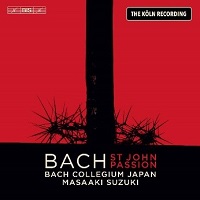 If the Handel Brockes Passion is in danger of being overshadowed
by Bach’s two mighty achievements, the converse is true: don’t let my
enthusiasm for the Handel diminish the importance of the St John Passion that almost never was, recorded by Masaaki
Suzuki and his Japan Bach Collegium on the eve of the shutdown occasioned
by the Covid-19 pandemic. As I wrote in my Late-2020 Retrospective,
anything I can say is almost superfluous. Anyone who has heard even one of
Suzuki’s many Bach recordings for BIS – all the cantatas, sacred and
secular, and more besides – will need no urging from me to beg, borrow or
steal this recording in one format or another. And, if further evidence is
needed, Colin Clarke’s Seen and Heard
review
of the Barbican performance says it for me, with words such as ‘remarkable’
and ‘unforgettable’. If that weren’t enough, John Quinn’s detailed
review
of the SACDs offers even greater confirmation that this is a wonderful
achievement. I need only
add that the 24-bit download sound,
from eclassical.com,
is first-rate, with no allowance needing to be made for the
circumstances. (BIS-2551, SACD).
If the Handel Brockes Passion is in danger of being overshadowed
by Bach’s two mighty achievements, the converse is true: don’t let my
enthusiasm for the Handel diminish the importance of the St John Passion that almost never was, recorded by Masaaki
Suzuki and his Japan Bach Collegium on the eve of the shutdown occasioned
by the Covid-19 pandemic. As I wrote in my Late-2020 Retrospective,
anything I can say is almost superfluous. Anyone who has heard even one of
Suzuki’s many Bach recordings for BIS – all the cantatas, sacred and
secular, and more besides – will need no urging from me to beg, borrow or
steal this recording in one format or another. And, if further evidence is
needed, Colin Clarke’s Seen and Heard
review
of the Barbican performance says it for me, with words such as ‘remarkable’
and ‘unforgettable’. If that weren’t enough, John Quinn’s detailed
review
of the SACDs offers even greater confirmation that this is a wonderful
achievement. I need only
add that the 24-bit download sound,
from eclassical.com,
is first-rate, with no allowance needing to be made for the
circumstances. (BIS-2551, SACD).
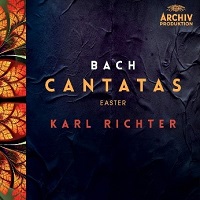 I’ve mentioned Karl Richter’s recordings of Bach cantatas, like the
Wenzinger Brockes Passion, as enshrining some of the very best practice
from the era before period instruments. There can be no better illustration
of their value than the selection for Easter and Eastertide, a
download-only offshoot of the DG complete set on 4835199,
4 hours and 40 minutes, with superb soloists such as Dietrich
Fischer-Dieskau and the Munich Bach Choir and Orchestra. Download in
lossless sound, with pdf booklet, for £11.97 from
Presto
(NB: earlier downloads of this set, still available, come with more colourful art-work
but cost more.)
I’ve mentioned Karl Richter’s recordings of Bach cantatas, like the
Wenzinger Brockes Passion, as enshrining some of the very best practice
from the era before period instruments. There can be no better illustration
of their value than the selection for Easter and Eastertide, a
download-only offshoot of the DG complete set on 4835199,
4 hours and 40 minutes, with superb soloists such as Dietrich
Fischer-Dieskau and the Munich Bach Choir and Orchestra. Download in
lossless sound, with pdf booklet, for £11.97 from
Presto
(NB: earlier downloads of this set, still available, come with more colourful art-work
but cost more.)
The blu-ray set of these cantatas seems to have
disappeared, like the similar Decca Solti Ring cycle, to be replaced with
95 CDs + 3 blu-ray audios (4839068). Amazon UK still have a few copies of
the 2-blu-ray set for £97.01; that’s more than when I recommended it for
around £45 –
Autumn 2018/1
– but better value than the £163.37 for the new replacement. The new set
also throws in the Passions, B-minor Mass, the Christmas Oratorio, and some
orchestral and organ recordings, but what are you to do with 95 CDs when
you have the blu-rays? And who thought a photo of Richter on a traffic
island preferable to the tasteful design of the original blu-ray set?
Qobuz
offer the five volumes of downloads between £13.49 and £20.99 each, with
booklet, good value when others are asking around £39 per volume in
lossless quality.
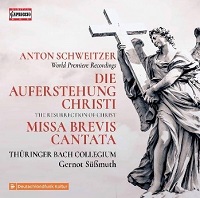 Anton SCHWEITZER (1735-1787)
Anton SCHWEITZER (1735-1787)
Die Auferstehung Christi
(The Resurrection of Christ) [61:18]
Lobet, Ihr Knechte des Herren
[11:23]
Missa Brevis
in C [26:21]
Mirella Hagen (soprano), Henriette Godde (mezzo), Stephan Scherpe (tenor),
Tobias Berndt (bass)
Thuringer Bach Collegium/Gernot Süßmuth
Reviewed as streamed in 24/48 stereo – no booklet included with download or
streamed version.
CAPRICCIO C5425
[2 CDs: 98:50] CD from
AmazonUK
–
Presto
Not the organ-playing Doctor Schweitzer, but a now little-known composer of
the generation after Bach; what we have here is the major part of his
sacred output, though some of his operas have survived, including Alceste, one of the earliest in German. The scores of that and
three other operas are available online but not, sadly, of these sacred
works. Those streaming or purchasing this recording as a download don’t
even receive a booklet of notes, which is doubly reprehensible when the
music is so little known and comes with a text. At least, the track details
give us some idea of what each movement of the Resurrection work and the
other cantata are about, while the Missa Brevis is a setting of
the familiar opening Kyries and Gloria which constituted
what is known as a Lutheran Mass.
It’s attractive and lively music; no masterpieces, but these premiere
recordings do it all justice. If you are looking for something other than
the more familiar Bach Passions and Handel’s Messiah, the latter’s
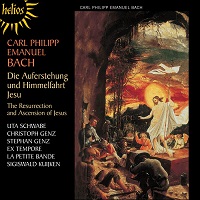 Brockes-Passion and this Capriccio recording could be just the
ticket.
Brockes-Passion and this Capriccio recording could be just the
ticket.
Or, if you don’t yet know the CPE BACH Die Auferstehung und Himmelfahrt Jesu
(Wq240, H777), which combines the Easter and Ascension narratives, there’s
a Hyperion Helios recording featuring Uta Schwabe (soprano), Christoph Genz
(tenor), Stephan Genz (baritone), Ex Tempore and La Petite Bande/Sigiswald
Kuijken (CDH55478).
I recommended that recording at full price in
April 2010
and, again, when at budget price, in
2014
. It’s now a little more expensive, but the download at £7.99 and the CD at
£8.50, both from
hyperion-records.co.uk,
won’t break the bank. Unlike the new Capriccio Schweitzer, it comes with
the booklet containing texts and translations.
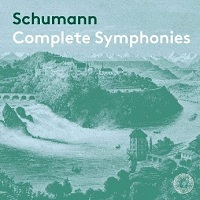 If you just want to celebrate the joys of Spring, there’s no better way
than with SCHUMANN’s Symphony No.1 (‘Spring’). It’s
coupled with No.2 on a Pentatone recording from Lawrence
Foster and the Czech Philharmonic, made in the Rudolfinum in Prague,
which we seem to have missed when it was released in 2008 (PTC5186326 [70:57]). It’s a lively performance, though
not, I think, quite the equal of the classic Josef Krips No.1 (Decca
Eloquence 4804325, with No.4 and Brahms), and though the Rudolfinum is a
high-class venue, this live recording suffers somewhat from its acoustics.
That’s not a major problem, however; there’s plenty of the joy of Spring
here.
If you just want to celebrate the joys of Spring, there’s no better way
than with SCHUMANN’s Symphony No.1 (‘Spring’). It’s
coupled with No.2 on a Pentatone recording from Lawrence
Foster and the Czech Philharmonic, made in the Rudolfinum in Prague,
which we seem to have missed when it was released in 2008 (PTC5186326 [70:57]). It’s a lively performance, though
not, I think, quite the equal of the classic Josef Krips No.1 (Decca
Eloquence 4804325, with No.4 and Brahms), and though the Rudolfinum is a
high-class venue, this live recording suffers somewhat from its acoustics.
That’s not a major problem, however; there’s plenty of the joy of Spring
here.
All four symphonies in these recordings have just been reissued as a
download-only offering at an attractive price, less than £10 for lossless
sound from
Presto
(PTC5186946). No.4 is performed in the 1851 version. The
single disc comes as an SACD and the download set is available up to 24/96
quality, but my review copy was in 16-bit CD-quality sound. The single
download comes with a booklet, the new twofer without. But don’t overlook
the splendid Dresden Staatskapelle/Wolfgang Sawallisch 2-CD set of all four
Schumann symphonies, with the Overture, Scherzo and Finale, available on CD
for under £13 – but more expensive as a download without booklet.
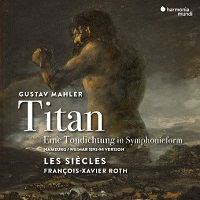 Spring is bustin’ out all over, too, in MAHLER’s First Symphony, especially if you listen to a
recording with the Blumine movement reinserted at the proper place
as the second movement. Most recordings don’t even give you the option of
omitting it if you prefer; my own perennial favourite from Rafael Kubelík
omits it, but offers Lieder eines fahrenden Gesellen, with
Dietrich Fischer-Dieskau, as a substantial compensation (DG).
Spring is bustin’ out all over, too, in MAHLER’s First Symphony, especially if you listen to a
recording with the Blumine movement reinserted at the proper place
as the second movement. Most recordings don’t even give you the option of
omitting it if you prefer; my own perennial favourite from Rafael Kubelík
omits it, but offers Lieder eines fahrenden Gesellen, with
Dietrich Fischer-Dieskau, as a substantial compensation (DG).
One version which does include Blumine and seeks to reproduce
Mahler’s second performance, when the work was still a ‘tone poem in
symphonic form’, comes from François-Xavier Roth and his period orchestra
Les Siècles on Harmonia Mundi HMM905299: Recommended –
review
–
review
–
Summer 2019/1.
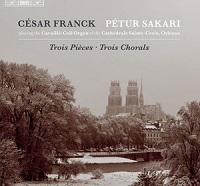 César FRANCK (1822—90)
César FRANCK (1822—90)
Trois Pièces pour grand orgue, FWV 35—37 (1878) [33:02]
Trois Chorals pour grand orgue, FWV 38—40 (1890) [46:45]
Pétur Sakari (1880 Cavaillé-Coll Organ)
rec. January 2020, Cathédrale Sainte-Croix, Orléans, France. DDD/DSD
Reviewed as 24/96 download with pdf booklet from
eclassical.com.
BIS-2349 SACD
[80:37] SACD from
AmazonUK
–
Presto
Organs have existed for centuries: the Greeks and Romans had something
called a hydraulic or water organ, a small portative thing with around a
dozen pipes, and Chaucer writes of the merry organs that played in church
on feast days. Again, these would have been small in size and range, so
neither the ancients nor the medievals could have imagined such a mighty
beast as the Cavaillé-Coll instruments that permitted Franck and others to
write music on such a massive scale, though Franck and the organ can do
delicate, too. There’s nothing particularly relevant to Easter on this
recent BIS release; even the Chorals are not based on any liturgical tune,
but it wouldn’t come amiss then – or at any time. The playing, condition of
the instrument, recording and BIS documentation are all first-rate. Having
edited Dan Morgan’s enthusiastic review for the main pages – Recommended
without reservation – I had to include a note here on it.
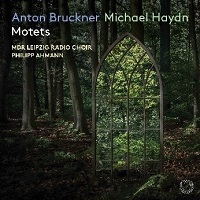 Anton BRUCKNER (1824-1896)
Anton BRUCKNER (1824-1896)
Graduale: Locus iste, WAB23 (1869) [3:07]
Offertorium: Inveni David, WAB19 (1868) (with 4 trombones) [2:42]
Graduale: Christus factus est, WAB11 (1884) [5:39]
Offertorium: Afferentur regi, WAB1 (1861) (with 3 trombones) [1:55]
Hymnus: Pange lingua, WAB33 (1868) [5:02]
Graduale: Os justi, WAB30 (1879) [4:23]
Motette: Ave Maria, WAB6 (1861) [3:33]
Hymnus: Vexilla regis, WAB51 (1892) [4:47]
Graduale: Virga Jesse, WAB52 (1885) [4:12]
Johann Michael HAYDN (1737-1806)
Graduale: Christus factus est
(from: In Cœna Domini ad Missam, 1796), MH628,2 [4:26]
O vos omnes
(from: Responsoria in Sabbato Sancto), MH278,5 (1778) [2:39]
Ecce quomodo moritur justus, MH deest [6:56]
Graduale: Christus factus est, MH38 (1761) [4:43]
Salve Regina, MH deest [3:35]
Tenebræ factæ sunt, MH162 (1772) [4:02]
Sebastian Krause, Eckart Wiegräbe, Uwe Gebel, Fernando Günther (trombones)
MDR Leipzig Radio Choir (MDR-Rundfunkchor)/Philipp Ahmann
rec. February 2020, Paul-Gerhardt-Kirche, Leipzig. DDD.
Texts and translations included
Reviewed as downloaded from press preview.
PENTATONE PTC5186868
[61:52] CD from
AmazonUK
–
Presto
I don’t know if the release of this recording was timed for the season, but
several of the works – not all of them are motets, despite the title – are appropriate
for Palm Sunday (the hymn Vexilla Regis) and Holy Week (five of
the Michael Haydn pieces).
Most of the Bruckner music is familiar, that of Michael Haydn, Joseph’s
talented younger brother and friend of Mozart, is less so. Indeed, I might
have enjoyed the recording even more if there had been more contributions
from him. His music, much of it sounding well ahead of its time, really
deserves to be much better known, yet, as far as I am aware, only the
Gradual Christus factus est is otherwise currently available on
record, on a BIS recording devoted entirely to his music (BIS-CD-859, all
first recordings). Some of the music on the new Pentatone recording doesn’t
even have an MH catalogue number.
The BIS recording appeared before MusicWeb
was really under way. It’s one of the great advantages in reviewing from
downloads and streaming that we can catch up with what we missed or
reviewed a long time ago.
The physical product comes as a hybrid SACD, but my press preview files, in
CD-equivalent wav format, sounded fine. Those in search of the highest res
will find PCM and DSD downloads, in stereo or surround, on the
Pentatone website.
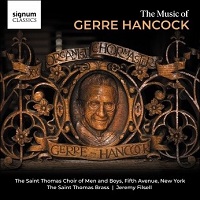 Gerre HANCOCK (1934-2012)
Gerre HANCOCK (1934-2012)
Choral and organ music
The Saint Thomas Choir of Men and Boys, Fifth Avenue, New York, Jeremy
Filsell
rec. February 2020, Saint Thomas, Fifth Avenue, New York. DDD.
Reviewed as downloaded with pdf booklet from
hyperion-records.co.uk
.
SIGNUM SIGCD631
[81:03] CD from
AmazonUK
Due in late April 2021.
With fewer recordings having been made in the last year, it’s perfectly
understandable that the record companies should be spreading their releases
rather more, but this is another release that would have been suitable for
Easter, with its central work, the short [7:48] Missa resurrectionis. Among the other works included are the
alternative Mattins canticle Jubilate Deo and the Evensong Magnificat and Nunc Dimittis. The programme ends with
Hancock’s setting of the spiritual Deep River.
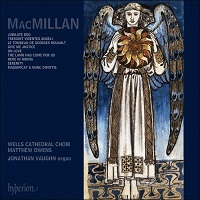 Sir James MacMILLAN (b.1959)
Sir James MacMILLAN (b.1959)
Seven Last Words from the Cross (1993) [46:24]
On the Annunciation of the Blessed Virgin (1997)* [6:41]
Te Deum
(2001)** [15:02]
Elin Manahan Thomas (soprano)**; James Vivian (organ)*/**
Polyphony
Britten Sinfonia/Stephen Layton
rec. 1-2 April 2004, St. Jude-on-the-Hill, Hampstead Garden Suburb; The
Temple Church, London. DDD/DSD
Texts and translations included
HYPERION SACDA67460 SACD
[68:35]
It’s quite a while since I
reviewed
the last few SACDs from Hyperion; despite my advocacy, this
recordng is still
hanging on in that format and, at £10.50, represents excellent value –
hyperion-records.co.uk. It’s also available on CD and as a lossless download (CDA67460).
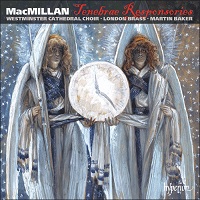
That SACD prompted me to explore MacMillan’s music more, including another
Hyperion recording,
CDA67867,
which includes his setting of the Passiontide O salutaris hostia; the main works are his settings of the three Anglican canticles, Jubilate Deo (Mattins) and Magnificat and Nunc Dimittis (Evensong). Matthew Owens directs the Wells
Cathedral Choir.
Returning to the theme of Holy Week, a third Hyperion recording contains
his Tenebræ Responsories and other music, this time from
Westminster Cathedral Choir, London Brass and Martin Baker (CDA67970 – CD and downloads, 16- and 24-bit, with pdf
booklet from
hyperion-records.co.uk). Recording of the Month –
review.
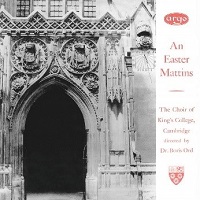 Of all the feasts of the church year that were cut down in size by the
reformation, Easter was the greatest sufferer. The first English Prayer
Book (1549) allowed for two Masses on that day, reduced to one service of
Holy Communion in 1552 and subsequent revisions. Apart from the usual
prescribed readings and psalms at Mattins and Evensong, the collect,
Epistle and Gospel for the day, as on every other Sunday, the only extra
provision is for certain sentences to be recited: ‘Afore Mattyns, the
people being assembled in the Churche, these Anthems shalbe fyrste
solemnely song or sayed.’ From 1552 on, these anthems were to be sung or
said in place of the invitatory psalm at Mattins. Even the unofficial
revision of 1928 added only the provision ‘on Easter Day and seven days
after’.
Of all the feasts of the church year that were cut down in size by the
reformation, Easter was the greatest sufferer. The first English Prayer
Book (1549) allowed for two Masses on that day, reduced to one service of
Holy Communion in 1552 and subsequent revisions. Apart from the usual
prescribed readings and psalms at Mattins and Evensong, the collect,
Epistle and Gospel for the day, as on every other Sunday, the only extra
provision is for certain sentences to be recited: ‘Afore Mattyns, the
people being assembled in the Churche, these Anthems shalbe fyrste
solemnely song or sayed.’ From 1552 on, these anthems were to be sung or
said in place of the invitatory psalm at Mattins. Even the unofficial
revision of 1928 added only the provision ‘on Easter Day and seven days
after’.
From that pretty thin gruel, amazingly, composers from Merbecke, Tallis and
Byrd onwards have managed to conjure up a much tastier meal, and no-one
serves it up better than King’s College, Cambridge. Decca reissued,
download only, in 2015
a 1957 Argo recording of An Easter Mattins on which Boris Ord
directed the choir in music by William Byrd, Thomas Tomkins, Herbert Howells and William Gauntlett (4789549 [43:30]). The
one composer you may well not have heard of, Robert Stone
(1516-1613), contributes a setting of the Lord’s Prayer and the programme
opens with the Easter carol – yes, there are such things, not just for
Christmas – ‘This joyful Eastertide’. Even for 1957, the (mono) sound is
rather faded; by then Decca and their Argo subsidiary were making much
better recordings, and in stereo, and the price of over £11 (more from some providers)
is rather steep for recordings of this age, but it remains a model of how
it used to be done, King James Bible readings and all.











